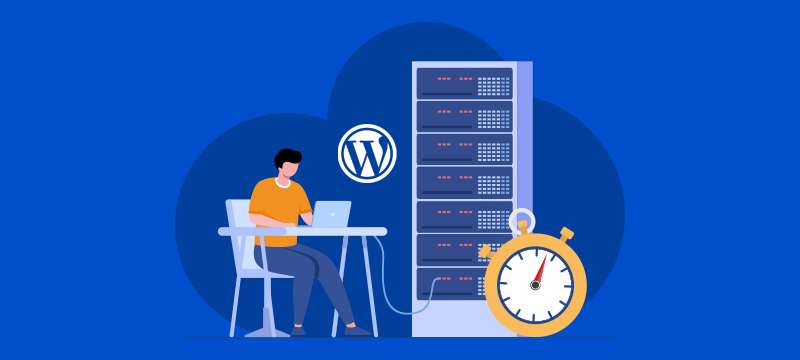In today’s quick and online world, where people swiftly lose interest, how fast a website loads is super important. One major thing affecting speed is how long the server takes to respond when someone tries to visit your site. This is called the Initial Server Response Time, or how quickly the first information comes from the server to the visitor’s browser. In WordPress, it is important to make this response time as fast as possible so that your site loads quickly and people stay happy.
Before moving further, let us understand the importance of WordPress. It is a widely used content management system. It is the first choice of most people who wish to build their own websites, blogs, or professional portfolios using different templates and plugins. Many large-scale and famous websites use this platform and the hosting companies offer many dedicated plans for WordPress.
In WordPress, it is important to make this response time as fast as possible so that your site loads quickly and people stay happy. This guide will help you learn simple tricks to make your WordPress site respond faster right from the start, making sure your website loads smoothly and without any delays.
Understanding Initial Server Response Time-
Before diving into optimization techniques, it is essential to understand what Initial Server Response Time is and why it is important. Initial Response Time refers to the time taken by the server to react to a request from the user’s browser. It consists of the time required for the server to process the request, fetch the data required, and start sending the response back to the browser.
A quick initial server response time is crucial because it directly affects the perceived speed of your website. A delay in this phase can lead to higher bounce rates, reduced user engagement, and poor search engine rankings.
Now, let us explore some effective strategies to reduce the initial server response time in WordPress-
- Choose a Reliable Hosting Provider-
- Utilize a Content Delivery Network (CDN)-
- Optimize WordPress Configuration-
- Enable Caching-
- Optimize Images and Media-
- Implement Gzip Compression-
- Optimize Database Queries-
- Monitor and Analyze Performance-
Choose a Reliable Hosting Provider-
The basis of a fast and quick website is a robust infrastructure. Choose from a reputable hosting provider that offers optimized servers, SSD storage, and efficient caching mechanisms. Shared hosting may be a cost-effective solution; however, it often results in slower response times due to resource sharing. You may consider Linux VPS Server or Managed WordPress Hosting for improved and enhanced performance.
Utilize a Content Delivery Network (CDN)-
A Content Delivery Network distributes your website’s static content across multiple servers worldwide, decreasing the distance between the user and the server. This helps in delivering content quicker and improving the initial server response time. Popular CDN services like Cloudflare, StackPath, and Amazon CloudFront flawlessly integrate with WordPress and offer easy setup options.
Optimize WordPress Configuration-
Perfecting your WordPress, configurations can considerably improve server response times. Minimize the use of plugins and themes, as each additional element increases the server load. Regularly update WordPress core, themes, and plugins to confirm optimal performance and security patches. Moreover, disable or eliminate unnecessary functionalities and scripts that contribute to server overhead.
Enable Caching-
Caching is a technique used to collect static versions of your website’s pages and deliver them quickly to users, avoiding the need to generate content dynamically with each request. Install a caching plugin like WP Super Cache, W3 Total Cache, or WP Rocket to generate cached copies of your WordPress pages and serve them to visitors, reducing the server response time significantly.
Optimize Images and Media-
Bulky images and media files can considerably slow down your website’s loading time. Compress images using tools like Photoshop, TinyPNG, or plugins such as Smush to reduce file sizes without compromising quality. Furthermore, consider lazy loading images and videos, so they only load when they come into the user’s viewport, further improving preliminary server response times.
Implement Gzip Compression-
Gzip compression decreases the size of your website’s files before sending them to the user’s browser, resulting in faster loading times. Most modern web servers support Gzip compression, and you can enable it either through your hosting provider’s control panel or by adding code snippets to your .htaccess file in the WordPress root directory.
Optimize Database Queries-
WordPress depends heavily on its database for storing content, settings, and user information. Poorly optimized database queries can increase server response times significantly, especially on high-traffic websites. Utilize plugins like WP-Optimize or WP-DBManager to optimize and clean up your WordPress database frequently. Moreover, consider implementing Object Caching with plugins like Redis or Memcached to cache database queries and improve performance.
Monitor and Analyze Performance-
Regularly monitor your website’s performance using tools like Google PageSpeed Insights, GTmetrix, or Pingdom. These tools provide insights into various performance metrics, including server response time, and offer recommendations for improvement. Analyze the results and implement necessary optimizations to ensure your website remains fast and responsive.
Conclusion-
Now, it is time to wrap up our article. Before we finish, let us quickly recap what we have covered. Making sure your WordPress site responds quickly when someone visits is super important. It helps make users happier, boosts your site’s visibility on search engines, and makes your website more successful overall. By using the tips, we have shared – like picking a good hosting provider, tweaking your website settings, and using caching – you can make your site load faster and work better. Moreover, do not forget, that it is important to keep an eye on your site’s performance over time and make adjustments as needed to stay ahead in the online world. Consider giving Best Managed WordPress hosting a try when building your strong website.
For further insights, delve into our blog on How Server Location Impacts Performance and SEO, optimizing your website for success.
